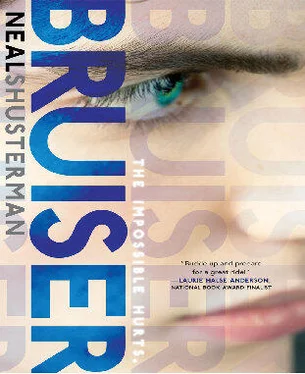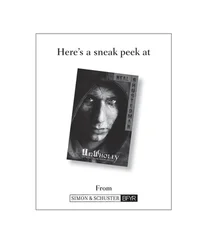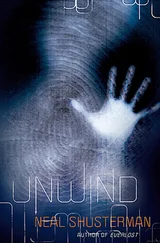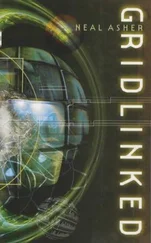Brew—with that photographic memory of his—is a quick study. By the time we’re done for the day, he’s got himself a respectable layup and can guard without fouling.
“Thank you, Mr. Sternberger.” His gratitude is genuine. “Not a problem, Brewster.”
“Call me Brew.”
It feels good to be out here and away from all the frustrations of life. In fact, the entire day feels abnormally good in a way I can’t quite describe. It’s that quirky kind of weekend feeling they write ridiculous sunny-day songs about. You know the ones—I’m sure they’re on your iPod even though you’d never admit it. As for my father, he’s more up than I’ve seen him in weeks.
“An hour on the court puts things into perspective,” Dad says as he hands the ball to Brew for a final shot. “I have a feeling things are just going to get better.”
It turns out he’s right. And at the same time very, very wrong.
Uncle Hoyt had a bad day the next week. He hadn’t had a real bad day for a while. Sure, he was always grumpy, but grumpy wasn’t foul. There were times when he was actually nice—like the night Tri-tip had died and he read me Goodnight Moon and a bunch of other little-kid books, and actually even kissed me good night.
“Don’t you worry about Tri-tip,” he’d told me, “he’s gone to a better place.”
Well, since I heard a chain saw going for two whole hours, I knew that the “better place” didn’t take a dead bull whole; but I guess he musta meant cow heaven.
That was a side of our uncle we didn’t see all that often, but it was good to see it when we did. Those are the times I always try to hold on to when he goes foul.
Like he did when his steamroller hit a car.
I wasn’t there when it happened, since he’s not allowed to ever take me to work, even on Take Your Kid to Work Day, cuz the work is dangerous and he usually does it at night. I found out the next day, when I got home from school.
It was Thursday, and Brew was out with Brontë at the mall. I wanted to go, but Brew said I wasn’t invited this time. He wasn’t even makin’ up stories for Uncle Hoyt anymore—not since last Sunday when he’d played basketball with Tennyson and his father. Things changed a little bit on that day. See, Uncle Hoyt wasn’t gonna let us go anywhere that morning, but Brew said he was gonna go out anyway.
“Where are you going? Who you gonna be with?” Uncle Hoyt had asked, but all Brew said was “None of your business, and none of your business.”
I expected Uncle Hoyt to start yelling, but he just said, “Careful there, Brew.” I couldn’t tell whether he meant to be careful out there, or be careful of him.
Then Brew showed him the cigarette burn and said, “One of these days you’re gonna test me, and there’ll be no one getting hurt but you.”
“Is that a threat, boy?”
“No, just the truth. I don’t know how I could go on caring about someone who won’t even let me have my own life.”
Even though it was my idea for Brew to tell Uncle Hoyt he wouldn’t like him no more, I never thought it would be such a big deal. Before it could get any worse, I shouted out, “Basketball! Brew and me are just going to the park for some basketball.”
Uncle Hoyt nodded but kept his eyes stuck on Brew. “Fine, then,” he said, but his voice didn’t say it was fine at all. “You want what’s out there, you go grab it, boy. Just don’t say I didn’t warn you.”
Ever since then things haven’t been right between them. They don’t fight, but they don’t talk much either; and when they’re in the same room, I feel like I don’t want to be there.
So anyway, it’s Thursday night, and it’s getting dark, and I come inside from tryin’ to fly that stupid kite again; but now it’s got so many holes, the wind couldn’t pick it up even if it wanted to cuz it would just blow through the holes. Once I’m inside, I can hear Uncle Hoyt all worked up on the phone. He’s pacing the kitchen, shouting about an accident he had the night before, explaining how it wasn’t his fault. A car veered over the cones and hit his steamroller, not the other way around. But I guess that doesn’t matter— someone has to get blamed. From what I can hear, a person is in the hospital. Stable condition, which I guess is better than dead. I did believe Uncle Hoyt when he said he didn’t do nothing wrong, because if there’s one thing he’s proud of, it’s the way he drives that steamroller. He drives it like there’s no one else in the world can do it as good as him.
So I’m standing in the living room, listening to him on the phone; but he’s already been drinking, and he’s slurring his words. I don’t think that helps things. From what Uncle Hoyt yells into the phone, I know that his boss has taken him off the roller and has given him the lowest job in road construction.
“Pushing tar?” he says. “I’ve been at this for years, and you’re making me push tar?” I hear some yelling on the other end of the phone, and then Uncle Hoyt says, “Fine, then I won’t come in at all.”
When Uncle Hoyt hangs up, he doesn’t just hang up; he hurls the phone at the refrigerator and it shatters into a gazillion pieces. That’s when he notices me standing there, watching him.
“What are you looking at?” he says. “Go do your homework.”
“I got none,” I tell him.
“Then just get out of my sight.”
“You gonna get fired, Uncle Hoyt?”
“Get outta here!”
I don’t need another invitation. I go to my room while Uncle Hoyt keeps on drinking. All the while I keep looking out of my window at the empty field and the fence and the houses beyond that, looking for Brew, hoping he’ll get home soon. I know he’s still out with Brontë. There’s no telling when he’ll get back. And I get to thinking that part of Uncle Hoyt’s bad mood is my fault, because I told Brew to say he wouldn’t like him no more. If I hadn’t done that, Brew would be home now instead of off with Brontë and if he was home, maybe Uncle Hoyt might not be so mad.
Right around sunset—the time Uncle Hoyt would usually be leaving for work—he goes out onto the porch instead. I can hear the squeak of the folding chair as he sits down and starts talking. He’s talking to nobody, having conversations with himself—all the things he wishes he could say to his boss and everyone else but doesn’t have the guts to actually say. He’s still chewing out his boss to the crickets when I get up to go to the bathroom.
I should have known what would happen next, and if I had been thinking ahead, I could have stopped it. See, he’s outside and I’m inside, and just last week our screen door handle busted. You can push it open from the inside, but once you’re outside you can scratch and paw at that door all you want; it’s near impossible to open—and totally impossible if you’re drunk.
“Cody!” I hear him call, but I’m still in the bathroom, taking care of business.
“Cody,” he calls again, “open the stupid door!”
And I’m hurrying as fast as I can to get off the pot, but there’s only so fast you can do such a thing. By the time I’m out of the bathroom, he’s screaming bloodymurder; and when I get out into the living room, I can see him through that screen.
His eyes.
I know those eyes.
Uncle Hoyt’s gone foul, and Brew is nowhere to be seen, and I don’t know what I’m gonna do, so I just stand there staring at him, afraid to open that door, knowing it’s only going to make it worse; but still I just stand there anyway, watching those eyes get fouler and fouler as he screams, “Open this goddamn door!” Finally he punches his fist through the screen and reaches inside, pulling the door open.
Читать дальше











